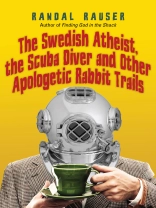In the real world, we don't usually sit in lecture halls debating worldview issues in systematic arguments. Chances are that we're more likely to have haphazard, informal conversations over a latte in a coffee shop.Meet Randal Rauser, a Christian, and Sheridan, an atheist. Over the course of one caffeinated afternoon, they explore a range of honest questions and real objections to Christian faith. Do people hold to a particular religion just because of an accident of geography? Is believing in Jesus as arbitrary as believing in Zeus? Why would God order the slaughter of infants or send people to hell? How do you know you're really real, and not just a character in someone's book?Their extended conversation unfolds with all the rabbit trails, personal baggage and distractions that inevitably come in real-world encounters. Rauser provides substantive argument-based apologetics but also highlights the importance of apologetics as a narrative journey. As we get to know Sheridan, we better understand the personal history that drives his atheism and the issues that motivate his skepticism.This imaginative narrative is a model of the rigorous pursuit of truth in conversation. Apologetics is not just about winning arguments; it is a transformative apprenticeship where eternity touches down in everyday life. It's about the discovery of truth through winding, weaving, honest, aimless, pointless and completely purposeful conversations between people who desperately want to know the way things really are.You, dear Reader, are already in this book. Randal has written you into the story, and you're sitting with him and Sheridan in the coffee shop, listening in on their dialogue. Discover what they have to say to each other—and to you.
Table des matières
Introduction
1. The Sacramental Properties of Caffeine
The Hidden Chapter Without a Name (a.k.a. The Chapter Between Chapters 2 and 3)
2. Why a Good Argument Ain?t Such a Bad Thing
3. The Grande Conversation Begins
4. ‘Reasonable’ Scientists, ‘Deluded’ Believers and the Quest for Objectivity
5. What Must You Do to See a Buffalo or Cast a Vote?
6. God, Matter and Other Astonishing Hypotheses
7. Faith: It’s In the Air
8. So Which Beliefs Are ‘Properly Basic’?
9. God Is Not a Hypothesis
10. How to Show that ‘God Loves Me’ Is False
11. The Swedish Atheist and the Scuba Diver
12. Will the Real Atheist Please Stand Up?
13. I Just Happen to Believe in One Less God Than You
14. The Pastry I Freely Choose
15. Naturalism, Scientism and the Screwdriver That Could Fix Almost Anything
16. God as a Simple Answer
17. A Giant Mickey Mouse Balloon and the Keebler Elves
18. From Personal Cause to Most Perfect Being
19. Why Zeus, at Least, Isn?t God
20. Would a Most Perfect Being Have a Most Imperfect Church?
21. Would a Most Perfect Being Command Genocide?
22. What Hath a Most Perfect Being to Do with a Most Horrendous Hell?
23. An Eternal Eye for an Eye
24. Three Types of Relativist and Two Types of Evil
25. Good Humans, Genocidal Aliens and Serial Killers Who Know What They Want in Life
26. Playing Games with Morality
27. God is Dead and You Have Killed Him, Et Cetera
28. What Does God Taste Like?
29. The Light Cast by Little Amazing Moments of Providence
30. The Taliban and the Serenity Prayer
31. Feel Free to Sit on the Fence, but Don?t Get Caught in the Lava Flow
32. Adieu
33. A Love Supreme
A propos de l’auteur
Randal Rauser is associate professor of historical theology, teaching in the areas of theology, apologetics, worldview and church history, at Taylor Seminary in Edmonton, Canada, where he was granted Taylor's first annual teaching award for ‘outstanding service to students’ in 2005. He earned his Ph.D. at King's College, London, where he focused on the doctrine of the Trinity. Rauser is the author of several books, including Faith Lacking Understanding, You're Not as Crazy as I Think, Finding God in the Shack and Theology in Search of Foundations.












